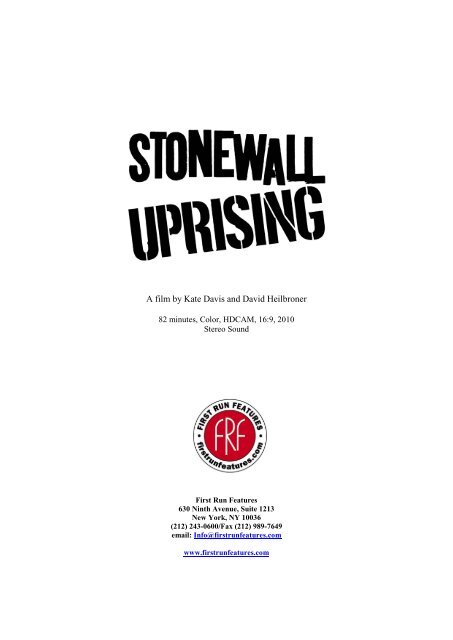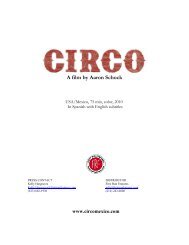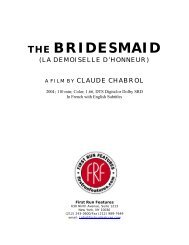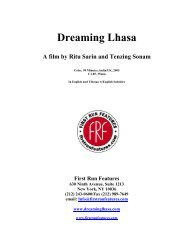Stonewall Uprising - First Run Features
Stonewall Uprising - First Run Features
Stonewall Uprising - First Run Features
You also want an ePaper? Increase the reach of your titles
YUMPU automatically turns print PDFs into web optimized ePapers that Google loves.
A film by Kate Davis and David Heilbroner<br />
82 minutes, Color, HDCAM, 16:9, 2010<br />
Stereo Sound<br />
<strong>First</strong> <strong>Run</strong> <strong>Features</strong><br />
630 Ninth Avenue, Suite 1213<br />
New York, NY 10036<br />
(212) 243-0600/Fax (212) 989-7649<br />
email: Info@firstrunfeatures.com<br />
www.firstrunfeatures.com
PRAISE FOR STONEWALL UPRISING<br />
“Gripping...Fresh and fascinating! When the [riot] happens we feel its necessity in our bones.”<br />
- Owen Gleiberman, Entertainment Weekly<br />
Critics' Pick! “Riveting, powerful!" - New York Magazine<br />
“Astounding...startling! The sense of elation can still be felt.” - Ronnie Scheib, Variety<br />
"PICK FOR THE WEEK! Kate Davis and David Heilbroner's taut documentary compellingly evokes<br />
the "Rosa Parks moment" of the gay-rights movement." -TIME Magazine<br />
“Essential...masterful...pitch-perfect!” - Arthur Ryel-Lindsey, Slant Magazine<br />
“Outstanding, emotionally and visually rich documentary… delivers plenty of fascinating archival material.”<br />
Doris Toumarkine, Film Journal International<br />
A-! “Gripping! Allows us to experience a landmark civil rights event in a fresh and fascinating way.”<br />
- Owen Gleiberman, Entertainment Weekly<br />
“a passionate and compassionate reconstruction…gracefully telescopes a lot of information ”<br />
- Carrie Rickey, The Philadelphia Inquirer<br />
“A wealth of archive footage and eye-witness interviews. I laughed, I cried, I loved it!"<br />
- Tim Macavoy, Inside Movies (UK)<br />
“Vitally important, fascinating.”-Frank Scheck, Hollywood Reporter<br />
“Make(s) chillingly clear how oppressive and downright dangerous life was for lesbian, gay, bisexual and<br />
transgendered people at that time.” –Kevin Thomas, Los Angeles Times<br />
“Essential.” –Gary M. Kramer, Gay City News<br />
“Eye-opening … Young people, in particular, having grown up in a world where being gay is not that big of a<br />
deal, may well be stunned at the bad old days.” -Stan Hall, The Oregonian<br />
« Entertaining, seamless, engaging, a clear narrative…A story about American freedom told by those who fought<br />
for their freedom.» - Stewart Nusbaumer, The Huffington Post<br />
“Conveys volumes of information briskly and efficiently within its superbly constructed framework. <strong>Stonewall</strong><br />
<strong>Uprising</strong> is an important film and a valuable document, but also an entertaining and vibrant look at a powerful<br />
moment in our recent history.”-Jason Bailey, DVD Talk<br />
“For LGBT history novices and experts alike, this film makes an impact. The documentary's combination of<br />
historical context, firsthand accounts of events, and photographs from the 1960s makes for a fascinating<br />
retrospective of this momentous event.” –Carly Dahlen, Ology<br />
“The viewer actually feels as if he or she is reliving all the events that led up to and included the two-night<br />
uprising.” -Allyn Sterling, Spectrum Culture<br />
“Gripping and informative.” –Kenneth R. Morefield, 1morefilmblog<br />
“praiseworthy documentary…will enjoy a long afterlife” –Elgy Gillespie, Culture Vulture<br />
"the best gay documentary film ever...cinematic triumph...superlative film"<br />
-George Holdgrafer, Lavender Magazine
STONEWALL UPRISING<br />
"It was the Rosa Parks moment," says one man. June 28, 1969: NYC police raid a Greenwich Village Mafia-run<br />
gay bar, The <strong>Stonewall</strong> Inn. For the first time, patrons refuse to be led into paddy wagons, setting off a 3-day riot<br />
that launches the Gay Rights Movement. Told by <strong>Stonewall</strong> patrons, Village Voice reporters and the cop who led<br />
the raid, STONEWALL UPRISING compellingly recalls the bad old days when psychoanalysts equated<br />
homosexuality with mental illness and advised aversion therapy, and even lobotomies; public service<br />
announcements warned youngsters against predatory homosexuals; and police entrapment was rampant.<br />
A treasure-trove of archival footage gives life to this all-too-recent reality, a time when Mike Wallace announced<br />
on a 1966 CBS Reports: "The average homosexual, if there be such, is promiscuous. He is not interested in, nor<br />
capable of, a lasting relationship like that of a heterosexual marriage." At the height of this oppression, the cops<br />
raid <strong>Stonewall</strong>, triggering nights of pandemonium with tear gas, billy clubs and a small army of tactical police.<br />
The rest is history.<br />
[Courtesy of Film Forum]<br />
FILMMAKER CO-BIOGRAPHY<br />
Kate Davis and David Heilbroner have been producing award-winning documentaries for 15 years. They codirected<br />
STONEWALL UPRISING (2010), the first non-fiction film to tell the story of the <strong>Stonewall</strong> riots by<br />
the participants. Their film, Scopes: The Battle Over America's Soul (History Channel, 2006), was part of Ten<br />
Days Which Unexpectedly Changed America, which won the Emmy ® for Best Non Fiction Series in 2006.<br />
Jockey (HBO, 2004), was nominated for 3 Emmys ® and won the Emmy ® Award for Best Non-Fiction Directing.<br />
Pucker Up: The Fine Art of Whistling (2004), was broadcast worldwide and had a limited US theatrical release.<br />
They also produced Diagnosis Bipolar (2010) and Plastic Disasters (2006) for HBO, and numerous social<br />
justice films including Anti-Gay Hate Crimes (A&E Networks, 1998) and Transgender Revolution (A&E<br />
Networks, 1999).<br />
Davis directed and produced Southern Comfort, which portrayed the life of a male transsexual. The Emmynominated<br />
film won over 25 awards, including the Grand Jury Prize for Best Documentary at the Sundance Film<br />
Festival (2001), Best Documentary Feature at the Florida Film Festival, San Francisco International Film<br />
Festival and Hot Docs in Toronto, <strong>First</strong> Prize at the Seattle Film Festival, the Grierson Award for Best<br />
International Documentary and the Special Audience Award at the Berlin Film Festival.<br />
Davis’ Girltalk, (1988) about three Boston street kids, was released theatrically and broadcast on PBS, ARTE<br />
(France), and Ch.4 (UK). She worked as an editor on Jennie Livingston’s Paris is Burning, Ross McElwee’s<br />
Sherman’s March and Robert Stone's American Babylon.<br />
David Heilbroner, is a former Manhattan prosecutor and author who has been making documentary films for<br />
more than ten years. He was Senior Producer for Crime Stories, a series for Court TV (1999), and<br />
directed/produced Transgender Revolution, Life After Death Row, The Dark Side of Parole, Anti-Gay Hate<br />
Crimes, and Untying the Straightjacket, (A&E Networks). As an author, Heilbroner wrote the critically<br />
acclaimed non-fiction books, Rough Justice and Death Benefit (which was made into a feature film for USA<br />
Pictures starring Carrie Snodgress) and has written widely on law and crime.
STONEWALL UPRISING CREDITS<br />
WRITTEN BY<br />
David Heilbroner<br />
BASED ON<br />
<strong>Stonewall</strong>: The Riots that Sparked the Gay Revolution<br />
by David Carter<br />
DIRECTED BY<br />
Kate Davis<br />
David Heilbroner<br />
EDITED BY<br />
Kate Davis<br />
PRODUCED BY<br />
Kate Davis<br />
David Heilbroner<br />
FILMED BY<br />
Buddy Squires<br />
MUSIC COMPOSED BY<br />
Gary Lionelli<br />
ASSOCIATE PRODUCER AND ADVISOR<br />
Eric Marcus<br />
RECREATION STILL PHOTOGRAPHY<br />
Heather Gude<br />
ADDITIONAL CAMERA<br />
Kate Davis<br />
ADDITIONAL STILL PHOTOGRAPHY<br />
Eric Marcus<br />
SOUND RECORDIST<br />
David Heilbroner<br />
CAMERA ASSISTANT<br />
Kitama Seeger Jackson<br />
ARCHIVAL RESEARCH<br />
Dana Kirchoff<br />
Michael Dolan<br />
CONSULTANT<br />
David Carter<br />
ARCHIVAL ADVISOR<br />
Katherine Linton<br />
TECHNICAL ADVISORS<br />
Chris Mara<br />
Franco Sacchi<br />
ANIMATION
Tim D'Amico<br />
ADDITIONAL ANIMATION AND EFFECTS<br />
Jorge Garcia-Spitz<br />
Quentin Heilbroner<br />
Chris Mara<br />
PRODUCTION ASSISTANTS<br />
Alexis Charizopolis<br />
Charles Harris<br />
TECHNICAL SUPPORT<br />
Obie Benz<br />
TRANSCIPTIONS<br />
Alexis Charizopolis<br />
Katrina Heilbroner<br />
Alexandra Meryash Nikolchev<br />
POST PRODUCTION FACILITY<br />
PostWorks NY<br />
POST PRODUCTION PRODUCER<br />
Mike Ashburn<br />
ON-LINE EDITORS<br />
Mike Nuget<br />
Andy Frielingsdorf<br />
COLORIST<br />
Ira Schweitzer<br />
SOUND DESIGN<br />
Ira Spiegel<br />
ASSISTANT SOUND EDITOR<br />
Daniel Fulton<br />
RE-RECORDING MIXER<br />
Tom Efinger<br />
AUDIO MIX ASSISTANT<br />
Jeff Seelye<br />
AUDIO MIX FACILITY<br />
Dig It Audio, Inc.<br />
REENACTMENT ACTORS<br />
Paul Bosche<br />
John DiGiacomo<br />
Dana Gaiser<br />
Noah Goldman<br />
J. Michael Grey<br />
David Huggins<br />
Louis Mandelbaum<br />
Leroy S. Mobley<br />
Samual Murkofsky<br />
Alfredo del Rio<br />
CASTING
Heather Gude<br />
Georgie Castle<br />
ARCHIVAL STILL AND MOTION IMAGES COURTESY OF<br />
ABC News VideoSource<br />
BBC Motion Gallery<br />
Martin Boyce<br />
David Carter<br />
Corbis Images<br />
Daily News<br />
Danny Garvin<br />
GettyImages<br />
Pennebaker Hegedus Films<br />
Historic Films<br />
Jerry Hoose<br />
ITN Source<br />
Giles Kotcher<br />
Bettye Lane<br />
Tommy Lanigan-Schmidt<br />
Linton Media<br />
MacDonald & Associates<br />
National Archives and Records Administration<br />
NBC News Archives<br />
New York Public Library<br />
New York LGBT Center Archives<br />
John O'Brien<br />
Oddball Film and Video<br />
Suzanne Poli<br />
Producer's Library<br />
Fred Sargeant<br />
Wolfson Florida Moving Image Archives<br />
Lilli M. Vincenz<br />
WPA Film Library<br />
THANKS TO<br />
David Alpert<br />
American Airlines<br />
Marc Aubin<br />
Martha Babcock<br />
Sophie Cabott Black<br />
Dan Bodner<br />
Hugh Bush<br />
Tom Caruso<br />
Colonial House<br />
Doug Cramer<br />
Liz Davis<br />
Joe DeCola<br />
Marjorie Duffield<br />
Evan Eames<br />
Barak Goodman<br />
Ellen Goosenberg<br />
Geordie, Liam and Theo Gude<br />
Amber Hall<br />
Jeremiah Hawkins<br />
Robin Haueter<br />
In the Life<br />
Judith Kuchar<br />
Alan Lechner<br />
Lester Senior Housing Community, Jewish Community Housing Corporation<br />
Frank Kameny
Barney Karpfinger<br />
Geoff Kole<br />
Judy Laster<br />
Susan Liberti<br />
Dan Martino<br />
Ellinor Mitchell<br />
Daniel Pine<br />
John Scagliotti<br />
Urban Stages<br />
John van Hoesen<br />
Seymour Wishman<br />
The Laramie Project Cast at The Calhoun School<br />
The Underground Lounge<br />
Trevor<br />
FOR<br />
AMERICAN EXPERIENCE<br />
POST PRODUCTION<br />
Vanessa Ezersky<br />
Glenn Fukushima<br />
Greg Shea<br />
SERIES DESIGNER<br />
Alison Kennedy<br />
ON-LINE EDITORS<br />
Spencer Gentry<br />
Mark Steele<br />
SOUND MIX<br />
John Jenkins<br />
PRODUCTION MANAGER<br />
Nancy Sherman<br />
WEB<br />
Molly Jacobs<br />
LEGAL<br />
Jay Fialkov<br />
Janice Flood<br />
Maureen Jordan<br />
Scott Kardel<br />
PROJECT ADMINISTRATION<br />
Susana Fernandes<br />
Pamela Gaudiano<br />
Tory Starr<br />
Patricia Yusah<br />
MARKETING AND COMMUNICATIONS<br />
Sean Cleary<br />
Jen Holmes<br />
Patrick Ramirez<br />
PROJECT MANAGER<br />
Lauren Prestileo<br />
SERIES MANAGER
James E. Dunford<br />
COORDINATING PRODUCER<br />
Susan Mottau<br />
SENIOR EDITOR<br />
Paul Taylor<br />
SERIES PRODUCER<br />
Susan Bellows<br />
SENIOR PRODUCER<br />
Sharon Grimberg<br />
EXECUTIVE PRODUCER<br />
Mark Samels<br />
A Q-Ball Productions film for AMERICAN EXPERIENCE<br />
(c) 2010<br />
WGBH Educational Foundation<br />
All rights reserved.
Movie Review<br />
Film Review: <strong>Stonewall</strong> <strong>Uprising</strong><br />
Outstanding, emotionally and visually rich documentary about the spontaneous 1969 <strong>Stonewall</strong> Inn riots<br />
that gave birth to and fueled the gay-rights movement comes out contemporaneously with the annual late-<br />
June global gay-pride celebrations that followed <strong>Stonewall</strong>.<br />
June 16, 2010<br />
-By Doris Toumarkine<br />
Yes, a number of previous documentaries (Before <strong>Stonewall</strong>, After <strong>Stonewall</strong>, Gay Sex in the 70s, etc.) have<br />
referenced the historic <strong>Stonewall</strong> event, but none has so clearly focused on the uprisings themselves. <strong>Stonewall</strong><br />
<strong>Uprising</strong>, while recalling the decades of pre-<strong>Stonewall</strong> gay oppression and the liberating, even euphoric<br />
<strong>Stonewall</strong> aftermath as homosexuality became more accepted and respected, provides a vivid look into the club<br />
itself and what went on in its Greenwich Village neighborhood over those three historic days.<br />
The uprising, spontaneous and unplanned, began early on June 28, 1969, with yet another New York City police<br />
raid on yet another Mafia-run gay bar in the Village. But this time—and for the first time—the patrons had had<br />
enough and refused to be led into the police paddy wagons. No one knows why this night was different, but<br />
footage conveying the anti-gay, pre-<strong>Stonewall</strong> climate suggests why resistance was inevitable.<br />
<strong>Stonewall</strong> <strong>Uprising</strong> delivers plenty of fascinating archival material, including Mike Wallace’s offensive<br />
commentary for an anti-gay, mid-’60s CBS report, so-called educational films damning homosexuality, and<br />
footage of raids, arrests, entrapment and harassment of Village gays and drag queens. Also on view in the<br />
interest of context: agitprop clips of heterosexual family life of the ’50s and ’60s, gays getting “therapeutic”<br />
shock treatment, and pronouncements from outspoken anti-gay shrink Dr. Charles Socarides.<br />
After anger over such treatment and depictions finally exploded beginning that early morning of June 28, the<br />
news media gave very scant coverage. Fortunately, the Village Voice offices were just down the street and ace<br />
reporters Howard Smith and Lucian Truscott IV rushed to the scene. They, gay-rights leaders and activists,<br />
<strong>Stonewall</strong> habitués and even a former NYC morals squad cop named Seymour Pine who led the raid are among<br />
the film’s many committed talking heads who help bring the event and its social climate alive. Notes Pine: “You<br />
know they broke the law, but what kind of law was that?”<br />
Also making the uprising more vivid are seamless reenactments, as skillfully interwoven as those in the Oscarwinning<br />
doc Man on Wire, that are hard to distinguish from the abundant archival material. Voice reporter Smith,<br />
among others, conveys what it was like to be trapped at the <strong>Stonewall</strong>, as those rioting outside kept the police at<br />
bay while making captives of those inside.<br />
<strong>Stonewall</strong> <strong>Uprising</strong> is also rich in flashbacks of Greenwich Village as the proverbial destination for gays, artists,<br />
misfits and dreamers. In its mini-history of the pre-<strong>Stonewall</strong> Village as a gay ghetto, the film touches upon the<br />
good, the bad and the icky. The ongoing oppression and harassment pushed gays to the far west of the Village, a<br />
free-for-all, ad-hoc party site for anonymous sexual encounters among the greasy trucks and rotting piers.<br />
The doc chronicles the repressive social milieu and legal minefield to which gays were subjected. What comes<br />
across is how similar the gay-rights movement was to the civil-rights battles, a point made by former New York<br />
mayor Ed Koch. Even the prejudices, propaganda and policies that assured oppression and marginalization<br />
shared similarities. And the revolutions and resolutions had common origins: so many people galvanized by just<br />
being so fed up with so much injustice.<br />
<strong>Stonewall</strong> <strong>Uprising</strong> also interestingly makes clear that humor—at the core of the drag phenomenon—mingled<br />
with the anger and resentment, so that there was little brutality to the uprising and even a built-in appeal. Over
the three days, pro-gay crowds and sympathizers grew, as did the movement that led to the first gay-pride march<br />
a year later and to the global June celebration of pride that continues today.<br />
ADVOCATE.COM – June 16, 2010 – interview with Kate by Brandon Voss<br />
http://www.advocate.com/Arts_and_Entertainment/Film/<strong>Stonewall</strong>_Riot_Girl/<br />
Posted on Advocate.com June 16, 2010 02:17:30 PM<br />
<strong>Stonewall</strong> Riot Girl<br />
With husband and filmmaking partner David Heilbroner, celebrated documentarian Kate Davis tackles the ugly<br />
truth about the <strong>Stonewall</strong> riots in <strong>Stonewall</strong> <strong>Uprising</strong>. Why? Just ask her ex-girlfriend.<br />
By Brandon Voss<br />
On June 28, 1969, an outraged gay mob resisted a police raid of the <strong>Stonewall</strong> Inn and ignited the modern gay<br />
rights movement. Directed by Kate Davis and husband David Heilbroner, <strong>Stonewall</strong> <strong>Uprising</strong>, which opens June<br />
16 in New York City before a summer release in more than 25 cities, is the first documentary that tells the story<br />
through interviews with actual riot participants and regular patrons of the Greenwich Village gay bar. Based on<br />
David Carter’s book <strong>Stonewall</strong>: The Riots That Sparked the Gay Revolution and produced for the PBS American<br />
Experience series, <strong>Stonewall</strong> <strong>Uprising</strong> also marks the sixth collaboration of the Emmy-winning filmmakers,<br />
whose credits include Southern Comfort, which documented the final year of a female-to-male transsexual and<br />
earned the Grand Jury Prize at Sundance. From a <strong>Stonewall</strong> Inn barstool in June 2010, Davis speaks to The<br />
Advocate about her long kinship with the LGBT community.<br />
The Advocate: I must admit that I didn’t expect a husband-and-wife filmmaking team to be behind a<br />
documentary on the <strong>Stonewall</strong> riots. What about the subject appealed to you?<br />
Kate Davis: Well, David and I have both been making films on LGBT subjects, civil rights, and equality issues<br />
in general for about 15 years, like Anti-Gay Hate Crimes and Transgender Revolution for A&E. But I’ve been<br />
fighting the fight since I was in high school in the late ’70s. I’ve never identified as straight, nor am I gay; I’m<br />
just attracted to who I’m attracted to. Why did I care enough about the subject to actually politicize these<br />
feelings? I guess I felt repressed myself — that sense from a young age that a girl’s supposed to act a certain way<br />
and a boy’s supposed to act a certain way. I actually took my girlfriend to the senior prom, and I wore a full tux.<br />
How did that go over?<br />
Now it’s a regular scandal, but back then there was just a dumbfounded reaction. The administration didn’t even<br />
know how to shut down the prom because they were so shocked. They’d never seen such a thing. Although the<br />
<strong>Stonewall</strong> riots had happened in ’69, I wasn’t really aware of it at 16, 17, and gay issues just weren’t talked<br />
about at my high school, even in the late ’70s.
Was your sexuality a struggle?<br />
Yes, because I liked girls as well as boys, and there wasn’t a place for that. I did form a gay rights committee in<br />
the yearbook, which was then banned by the administration, but it was a fake group anyway because nobody was<br />
out. Frankly, I chose the smartest, shiniest stars of my class, who all presented as straight, and they were all<br />
willing on principle to be a part of this gay rights committee that was phantom, just to make the point that we<br />
could have and should have really existed.<br />
Was your husband, David, always interested in gay rights, or did you introduce him to those issues?<br />
He’s always been comfortable with gay people — some of his closest friends are gay — so there’s never been a<br />
boundary or distance between him and gay issues. But I don’t think it’s a totally random coincidence that we<br />
would end up making films about gay and transgender rights even though we’re not squarely in those<br />
communities, because sometimes it takes a little bit of distance and perspective.<br />
Had you read David Carter’s book about <strong>Stonewall</strong> before PBS approached you to make the film?<br />
No. Like many people, I thought I knew everything about the <strong>Stonewall</strong> riots, but I found that there’s a lot to the<br />
story that most people don’t know.<br />
What did you learn about the riots that most surprised or horrified you?<br />
We didn’t really think it would be the case going in — and this became increasingly important as we did our<br />
research and looked at archival material — but we realized that the riots could only be understood by<br />
understanding the context of the time. It was a really dark, medieval time, though we’re talking only 40 years<br />
ago. I was shocked, for example, by the laws of the time and how the main institutions dehumanized gay people<br />
to the point where lobotomies and shock therapy were routinely performed. You would’ve thought that a city<br />
like New York, especially in the Village, was a refuge for gay people during this period of free love and the birth<br />
of the social revolution, but the gay bars were essentially illegal, Mafia-run, and the NYPD was particularly<br />
strict, cracking down on gays all the time. Police went as far as dressing up in drag to entrap gay people and<br />
throw them in jail. It was terrifying.<br />
Of the many gay men and women you interviewed for the film, whose personal story touched you the most?<br />
Everybody’s did in its way. Danny Garvin was so scared of coming out in the Navy that he tried to slit his wrists.<br />
Martin Boyce talks about never wanting to tell his mother, who was in a wheelchair, because it would’ve broken<br />
her heart, and how he spent his childhood trying to imitate straight people. Virginia Apuzzo, who has gone on to<br />
be a real force in gay rights, went to a convent because she was so torn up inside and wondered if she was<br />
doomed to go to hell.<br />
You also spoke to the NYPD officer who led the <strong>Stonewall</strong> raid, but your most controversial interview<br />
subject might be former New York City councilman and mayor Ed Koch.<br />
Yes, he will not be everybody’s friend, but I’ll tell you why we have Ed Koch. It’s not a film about his often<br />
very questionable political actions at the time — he was on record for supporting crackdowns — so it wasn’t a<br />
Frost/Nixon situation where we were out to get Ed Koch. In my mind, it was important to get him to legitimize<br />
the claims we’re making in the film that the New York government and police force were really out to get gay<br />
people, and Ed Koch admits that was the case.<br />
Why does your film make no mention of the prevalent myth regarding Judy Garland’s death and funeral<br />
as a possible catalyst for the riots?<br />
We asked every single participant about Judy Garland, and we would’ve included it if anybody had said it was<br />
fire on the match, but no one did. As a matter of fact, one person interviewed in the film was actually at Judy<br />
Garland’s funeral, and even he said, “Look, we were street kids. We loved her, but there was a larger anger at<br />
play here.”<br />
Was your ultimate goal to make a film with mainstream crossover appeal, or were you content to<br />
document gay history primarily for gay audiences?<br />
I believe it can reach everybody on different levels. It’s been very gratifying at various festival screenings to see<br />
how many gay people, older and younger, have been amazed at how little they knew about the riots or the laws<br />
in place at the time. For some, it’s a nostalgic way to remember their childhood, both the pain and the humor that<br />
was used as a defense. But like Milk, if I may be so bold to use that as an example, this film is a good story, an<br />
important story, and it should become a much firmer part of American history. I hope this film educates and<br />
inspires people to see that while the battle isn’t over, we’ve clearly come a long way. So part of our larger goal<br />
was to help make gay history American history. Why isn’t this being taught in our schools? It should be up there<br />
with Rosa Parks. Gay youth, even if they’re focused on the gay marriage debate, may not really know where we<br />
came from. One kid said to me, “Oh, I think I’ve heard of Stonehenge.”







